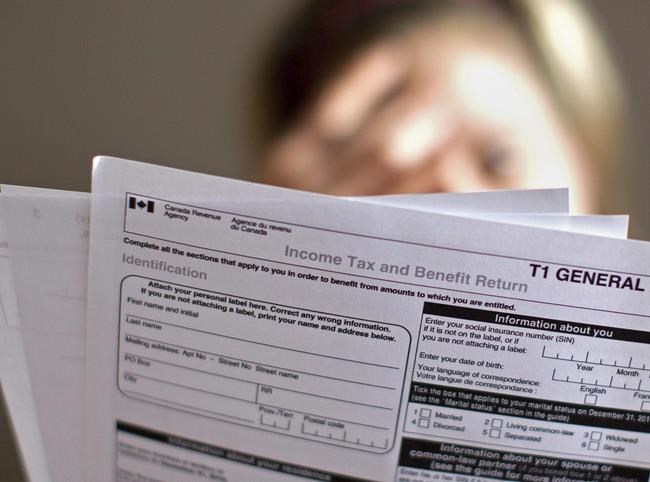TORONTO — Canadians tend to procrastinate when it comes to completing their tax returns despite some of the advantages of early filings, say tax experts.
The annual tax season got underway last week, and individual Canadians have until April 30 to file — a deadline many will meet in a last-minute rush.
“We do notice a spike towards the end of April with the returns coming in sort of at the last minute because that's the nature of Canadians filing their returns,” says Paul Murphy, a spokesman with the Canada Revenue Agency.
Murphy says filing early ensures that government benefits such as Canada Child Benefit, GST credit and provincial credits aren't interrupted.
Early filing also speeds up payment of refunds so the money can be put to work sooner — within eight to 10 days of an electronic filing — to pay debt, make purchases or to invest, says Lisa Gittens, a senior tax expert at H&R Block.
Last year, 96 per cent of returns filed digitally were processed within two weeks, and within eight weeks for paper submissions.
Two-thirds of taxpayers filed their 2017 taxes last April, about 30 per cent in March and less than four per cent in February, according to the Canada Revenue Agency.
Some 4.3 million returns were filed in April 2018, with the average amount owing at $5,509, more than double the amount owed for those filing in February and March. An average refund of $1,838 was obtained for the more than 9.2 million returns filed last April.
For those owing money, early calculations give taxpayers more time to save to pay the tax bill and avoid late penalties and interest.
“You’ve got two or three months to put the money together instead of waiting until April and then you’ve only got one month ... to get all of that balance owing in your hands,” Gittens said in an interview.
The process could also alert taxpayers to savings from purchasing RRSPs before the March 1 deadline.
Submitting early also protects the taxpayer from scammers. It reduces the chances of someone filing a fraudulent return on their behalf and being left on the hook for outstanding balances.
However, filing early doesn't mean taxpayers should race to submit a completed return on the Feb. 18 season opener, adds Jamie Golombek, managing director of tax and estate planning at CIBC Wealth Advisory Services.
Many of the required income slips don't have to be sent to taxpayers until the end of February while donation receipts and trust paperwork may not come in until March.
“If you're the type of person that does make these sort of haphazard donations here and there, you might want to wait for the first week of March which is pretty safe in most cases,” he said.
The key is to ensure that all slips are ready to submit because omissions will require a refiling that will delay the refund, said Golombek.
Avoiding the last-minute rush in April could also save money and result in better service from professional tax preparers.
Taxpayers can save up to 40 per cent of the cost of a return by engaging a tax professional before March 15, said Gittens.
“We're not as busy and we have early filing fees,” she said.
“The tax professional will (also) have the time to sit down with you and tell you what you need to prepare.”
H&R Block also offers free access to its online tax preparation software and network to file a return until mid-March.
The 2018 tax year has few new features.
However, residents of Saskatchewan, Manitoba, Ontario and New Brunswick can claim Climate Action Incentive payments for the first time. Some other provinces already offer these tax credits.
Any taxpayer over the age of 18 will receive a $154 refund regardless or income.
A 10 per cent supplement is available for residents of small and rural communities because of increased energy needs and reduced access to clean transportation options, the Canada Revenue Agency said.
For small businesses, the tax rate has decreased to 10 per cent from 10.5 per cent.
CRA says it has made improvements to its telephone system that handles about six million calls during tax season. Callers will avoid getting a busy signal and instead be told the estimated wait time to call back or directed to use self-service options.
It has also added a new help line for tax professionals who register in advance.
While nearly 90 per cent of the more than 29 million personal and business tax returns were filed electronically last year, the federal agency says it has no plans to eliminate paper for the more than 1.7 million Canadians who prefer completing returns manually.
- Ross Marowits, The Canadian Press
